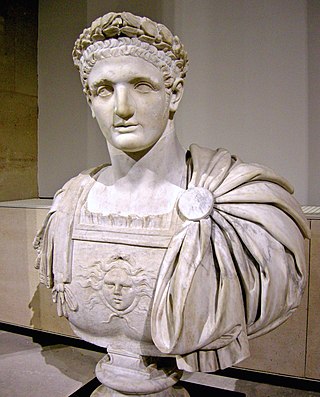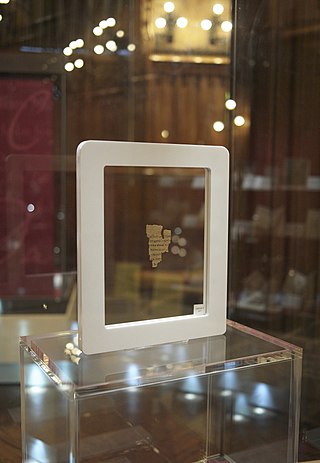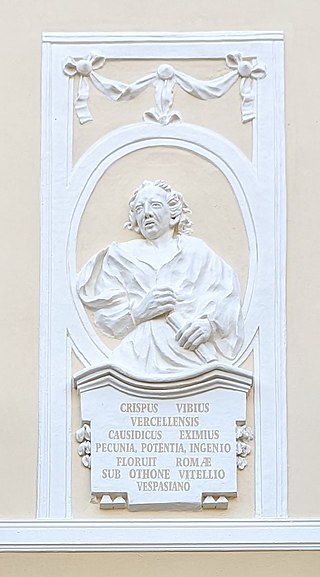Related Research Articles

The 90s was a decade that ran from January 1, AD 90, to December 31, AD 99.
AD 83 (LXXXIII) was a common year starting on Wednesday of the Julian calendar. At the time, it was known as the Year of the Consulship of Augustus and Quintus Petillius Rufus. The denomination AD 83 for this year has been used since the early medieval period, when the Anno Domini calendar era became the prevalent method in Europe for naming years.

The Rylands Library Papyrus P52, also known as the St John's fragment and with an accession reference of Papyrus Rylands Greek 457, is a fragment from a papyrus codex, measuring only 3.5 by 2.5 inches at its widest, and conserved with the Rylands Papyri at the John Rylands University Library Manchester, UK. The front (recto) contains parts of seven lines from the Gospel of John 18:31–33, in Greek, and the back (verso) contains parts of seven lines from verses 37–38. Since 2007, the papyrus has been on permanent display in the library's Deansgate building.
Aulus Didius Gallus Fabricius Veiento was a Roman senator who played a major role in the courts of several Roman emperors during the first century AD. For his usefulness, Veiento was rewarded with the office of suffect consul three times in a period when three consulates were very rare for non-members of the Imperial family.
Quintus Sosius Senecio was a Roman senator who was favored by the emperors Domitian and Trajan. As a result of this relationship, he was twice ordinary consul, an unusual and prestigious honor: first in 99, with Aulus Cornelius Palma Frontonianus as his colleague; and again in 107 as the colleague of Lucius Licinius Sura, who was himself consul for the third time.
Flavia Domitilla was a Roman noblewoman of the 1st century AD. She was a granddaughter of Emperor Vespasian and a niece of Emperors Titus and Domitian. She married her second cousin, the consul Titus Flavius Clemens, a grand-nephew of Vespasian through his father Titus Flavius Sabinus.

Lucius Volusius Saturninus was a Roman senator from the powerful plebeian Volusia gens, or family. He held several offices in the emperor's service. Saturninus attracted the attention of his contemporaries for his long life: he died at the age of 93, and having sired a son at the age of 62.
Quintus Volusius Saturninus was a Roman Senator who lived in the Roman Empire during the Principate. He was consul in the year 56 with Publius Cornelius Scipio as his colleague.
Lucius Volusius Saturninus, also known as Lucius Volusius was a Roman Senator from the powerful plebeian Volusia gens, or family. He was a cousin of emperor Tiberius.

Marcia Furnilla was a Roman noblewoman who lived in the 1st century. Furnilla was the second and last wife of the future Roman Emperor Titus as well as the aunt of the future emperor Trajan.

Papyrus 26, designated by 𝔓26, is an early copy of the New Testament in Greek. It is a papyrus manuscript of the Epistle to the Romans, it contains only Romans 1:1-16. The manuscript paleographically has been assigned to the late 6th or early 7th century.
Libo Rupilius Frugi was a Roman senator and an ancestor of the emperor Marcus Aurelius. He served as suffect consul in 88.

Lucius Junius Quintus Vibius Crispus was a Roman senator and amicus or companion of the Emperors, known for his wit. He was a three-time suffect consul.
Lucius Aelius Lamia Plautius Aelianus was a Roman senator.
Lucius Volusius Saturninus was a senator of the early Roman Empire, who was active during the Principate. He was a member of the College of Pontiffs.
Lucius Volusius Saturninus was a Roman Senator who lived in the 1st century. He served as an ordinary consul in 87, as the colleague of the emperor Domitian. He is known entirely from inscriptions.
Quintus Volusius Saturninus was a Roman Senator who lived in the Roman Empire in the second half of the 1st century AD and the first half of the 2nd century. He was ordinary consul for the year 92 as the colleague of the Emperor Domitian, consul for the sixteenth time. He is primarily known through inscriptions.
Volusia Saturnina also known from her funeral inscription as Volusia Latina Saturnina was a Roman noble woman who lived in the Roman Empire in the second half of the 1st century BC and first half of the first century AD.
Lollia Saturnina (c.10-41) was a Roman noble woman who lived in the Roman Empire in the 1st century. She was the sister of the Roman empress Lollia Paulina and was a mistress of the Roman emperor Caligula.
The Volusia gens was an ancient Roman family.
References
- ↑ Géza Alföldy, Konsulat und Senatorenstand unter der Antoninen (Bonn: Rudolf Habelt, 1977), p. 188
- ↑ Jones, The Emperor Domitian, p. 176
- 1 2 Advanced Papyrological Information System, UM, P.Mich.inv. 3240; Recto